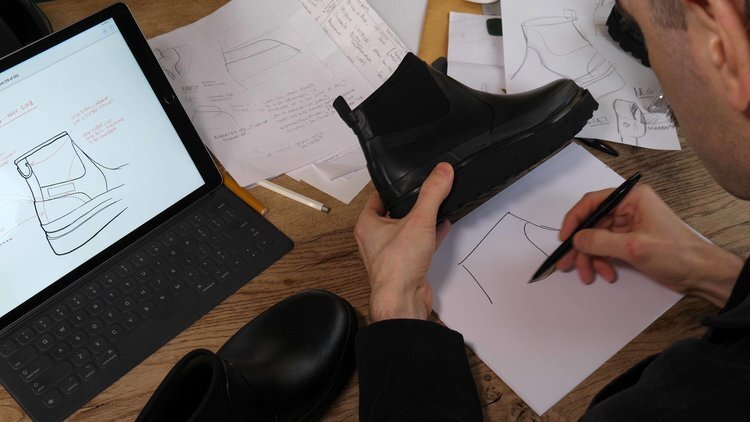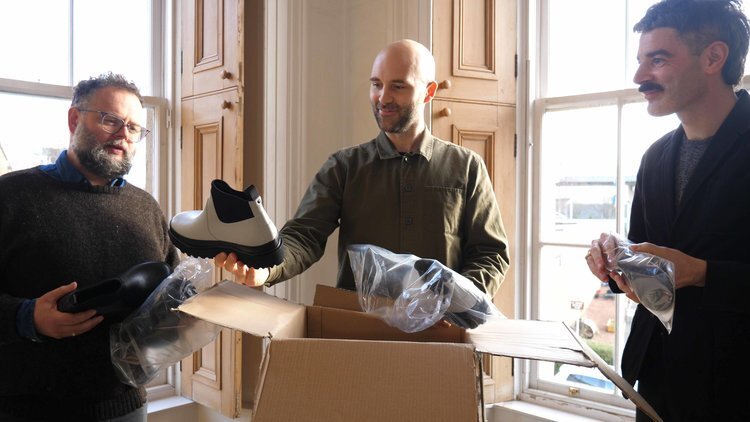So, You’ve Got a Good Idea and You Want to Start a Business?
IMAGE: BOTANNWhen Hunter moved production for its famed wellingtons from Scotland, Michael Nicholson decided to launch a mission to get wellies made in Scotland again. Like most businesses starting out, it hasn’t been plain sailing.
Michael writes eight lessons he’s learnt when launching a business.
WORDS BY MICHAELIdeas come from all kinds of places. I’ve got this idea that I’ll write a film one day and it’s based almost entirely on the day I was jogging through the east end of Glasgow and Terrible Love (Alternate Version) by The National happened to start playing on shuffle. I’m not sure if it was the first time I’d heard that song or that version of that song, but it seemed that way. As I ran through a particularly drab world of abandoned shopping trollies and some equally unloved buildings -the ones with small unlikely trees growing out of them- the idea of a story flooded into my head.
It came from almost nowhere. Actually, it came from a hundred life experiences that were somehow coherently arranged together by just over four minutes of fairly melancholic but strangely uplifting music. The thought of that moment -two or so years ago- still fills my head with possibility and adventure. An idea yet to be explored.
“That’s how ideas work, I suppose. They come from your relationships, your experiences, the change that you want to make and a moment or two of inspiration.”
It was certainly this combination of things that gave rise to the idea of a new Scottish welly boot company. For me, personally, it was new relationships with my fellow co-founders, my experience of being born and raised in a relatively small Scottish town that once made some of the best wellies in the world, my career in journalism and marketing, a weekend at the DO Lectures, where the story of Hiut Denim left a considerable impression on one of my business partners and the desire to bring welly boot manufacturing back to Scotland.
That idea bounced around coffee tables, social occasions, meetings, presentations and focus groups for around three years before it found its wings. A key but difficult part of this breakthrough was wrapped up in the realisation and reluctant acceptance that we’d need to take the scenic route to our ultimate objective of rediscovering Scottish welly manufacturing. So we focused on design, identity and finding our audience to establish ourselves in the market – on a platform from which we can grow.
It’s been around nine months since we launched the business properly through a Kickstarter campaign. Though we’re now established and looking at the next stage of our progression, we’re still very young, we have lots of things to learn, quite a few more mistakes to make, and a long old journey ahead before we reach our destination.
Eight lessons I’ve learnt in launching a business:
Ideas need time to mature at their own pace. They need time to breathe, space for expansion, and a gentle prod every so often – just to make sure they’re still alive. Not all ideas will grow into the amazing wonders of innovation and success. Some are better staying just that, as an idea.
Momentum is really important. A lack of momentum breeds pointlessness and disinterest. Landmarks and small, achievable goals are very useful.
People want to help. It took some persuasion for me to truly accept this, but they do, especially if they like your idea and can be part of the early stages of your journey.
Business partners need to be able to recover from disagreements, heated discussions and maybe even the odd angry swear word. As roles are established, there’s probably going to be a little turbulence.
Crowdfunding has many positives. It raises funds, acts as a marketing engine, helps you to discover and connect with your audience, and can be pretty darn exciting. Know also that it is very demanding, and your crowdfunding customers are not like traditional customers. They are invested, they are patient and you owe them, so they need love and attention. Know this. It’s important.
You are not superwoman or superman. Share the load, share logins, share anything you can. If others aren’t offering to share the responsibilities, demand it of them. Your mental strength will be thankful in the long-run, and you’re going to need it.
You make a lot of decisions. Some seem big, others don’t seem that big, but they all add up to become what your business is. No one else sees that process, they only see the final result, which they justifiably see as the exact thing you want to present to the world. So be true to your beliefs, your ethos, and yourself at all times.
Grow from your mistakes. Allow yourself to enjoy the successes. Have fun. If you stop having fun, it’s probably time for a new idea.
IMAGE: BOTANN



